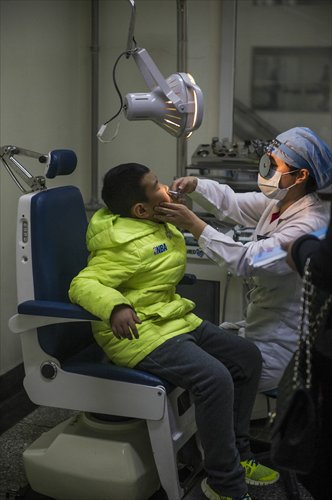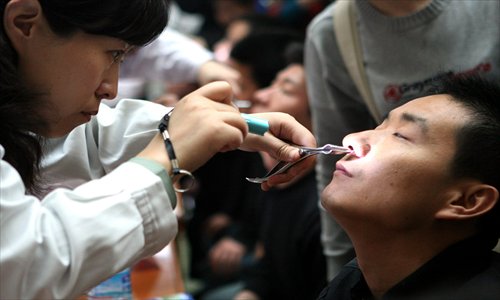'Kill the doctors'

Removing bones in the nose can lead to nightmarish complications. Photo: Li Hao/ GT
The Internet has lit up with conversations about an obscure complication from nose surgery this month, after an article titled "Empty Nose Syndrome - the real murderer of the doctor-stabbing case?" started circulating.
The tragic case happened last month in the No.1 People's Hospital of Wenling, Zhejiang Province, where Wang Yunjie, the chief physician of the ear-nose-throat department, was stabbed to death by Lian Enqing, a patient who had been dissatisfied by surgery performed at the hospital, the Global Times reported on November 1.
Lian was reportedly suffering from nasal obstruction, headaches and insomnia after nose surgery, but several examinations showed nothing wrong. Lian's family suspected him of having psychological problems and forced him to accept mental treatment.
The article said Lian killed the doctor because Lian suffered from Empty Nose Syndrome (ENS), a side effect of nasal surgery.
Some typical online commentary, in a QQ group named ENS, came from a patient who only gave his surname as Zhang. "Now I have become used to the pain. But it was terrifying for the first few years, because nobody understood," he said.
Zhang told Metropolitan that he has had ENS for more than nine years, and it has made him depressed. During the group chat, Zhang and a few other patients mentioned phrases such as "a life worse than death," "commit suicide" and "kill the doctors" a few times.
There are dozens of groups like this, and many of the groups have over 100 participants.
An overnight sensation
Many people in China were rattled to hear of a patient killing a doctor. But the patients of the QQ groups didn't have any trouble understanding Lian's action, saying they experience the same pain.
Like many other patients, Zhang suffered from nasal dryness and trouble breathing after undergoing surgery to remove parts of the turbinates, a series of bone shelves in the breathing passage of the nose.
"My nose is dry, my lungs feel uncomfortable and I cannot sleep well at night," said Zhang, who had to quit his job and rest at home for more than a year after the surgery. Zhang went to many hospitals to check his nose, but they all said it was fine. He searched for the symptoms online, and later learned it was probably ENS.
Last year, Jerry Xie, 30, was diagnosed with rhinitis, and it became worse this year. He took his doctor's advice and had surgery to remove part of his turbinates on October 7. Xie is not sure if he has ENS yet. He has the symptoms, including nasal dryness with yellow, thick mucus that sometimes has blood in it.
But Xie didn't mention his worries to his doctor, before or after the surgery. "I think this matter is quite sensitive these days. I was worried that if I had talked to the doctor about it, he would feel under great pressure and cut less than he thought he should."
What's your problem?
"I can understand why the incident [in Wenling] happened," said Xie. Having talked to other people in the QQ groups, Xie thinks the attitudes of different people are determined by the severity of the disease. "Some are very fiery in speech, very pessimistic. I think they have had the disease for a long time."
"People with ENS actually should be thankful for that incident. Or else, many people and I myself wouldn't know about the word or the patients," Xie said. "I hope the media will pay more attention to ENS. Modern medicine is very advanced, and I believe, if taken seriously, this difficult problem can be tackled by experts."
If ENS is so common and causes so much pain, why haven't the majority of us heard about it? Probably because it doesn't happen often. According to an academic study published in the European Annals of Otorhinolaryngology, Head and Neck Diseases in April 2012, ENS is a rare complication of nose surgery.
An otolaryngologist surnamed Yu from the First Hospital of Jilin University told Metropolitan that ENS was first mentioned in 1994. It's caused by surgery, but the physiopathology remains unclear, Yu said.
Usually it's said that there are two causes. The first is excessive removal of turbinates, which play a vital role in humidifying, filtering and warming the air, and adjusting the airflow, said Yu. "When turbinates are removed and the nose is too empty, airway resistance is reduced, which affects the lungs, thus creating a feeling of stiffness. [The second cause is] a loss of nerve endings along with the turbinates," Yu explained.
"The main diagnostic criteria is paradoxical nasal obstruction," said Yu. It's paradoxical because patients feel their nose is stuffed, but it is not.
Yu said there are many patients suffering from nose diseases, especially in the north where it's dry and cold. Yu admitted that the problem of excessive surgical removal does exist. Patients who undertook the surgery in the 1980s and 1990s are especially at high risk in having ENS. Overall, there's a 10 percent chance of having ENS after surgery, Yu said.
"There are many nerves inside the nasal cavities, making them very sensitive," said Yu, adding that he has often heard patients complaining that nose diseases don't kill people, but make them very miserable.

Nose surgery can lead to a painful, hard-to-diagnose condition. Photo: CFP
Physically and mentally painful
According to statistics released in a report by the Chinese Hospital Association, on average there were 27 violent attacks against medical staff in each hospital in 2012 in China. The report also pointed out that the attacks usually happened because of a large gap between treatment results and patients' expectations, unsuccessful communication, high expenses and poor medical service attitudes.
The otolaryngology department is said to be at high risk when it comes to doctor-patient relationships. "Ears, throats and noses are the first defense of one's body, and there are many patients. The patients have high expectations and the treatment results are very different, which easily causes disputes. That's because a great deal of subjectivity is involved in the symptoms [of patients with diseases of the ear, nose and throat]," said Yu.
Many diseases cannot be cured, and many diseases don't have clear diagnostic criteria yet, said Yu. "Doctors should explain to the patients what to expect after surgery. But many patients in China have too high expectations on medicine. They assume doctors can fix anything."
He Yumin, director of the psychosomatic medicine branch under the Chinese Medical Association, told Metropolitan that ENS falls in the category of psychosomatic medicine, a field studying the relationship of social, psychological and behavioral factors on one's body.
"It's not a deadly disease," said He, who explained that any physical pain can have a great impact on one's mentality.
"[The doctors] should ask themselves: Does the patient necessarily need a surgery?" He also pointed out the problem of overtreatment.
"You should observe the patient's experiences, and care about how they feel," He said.